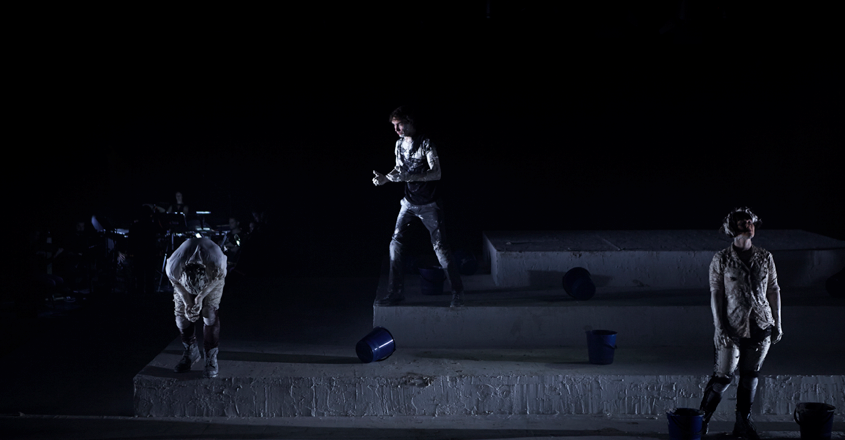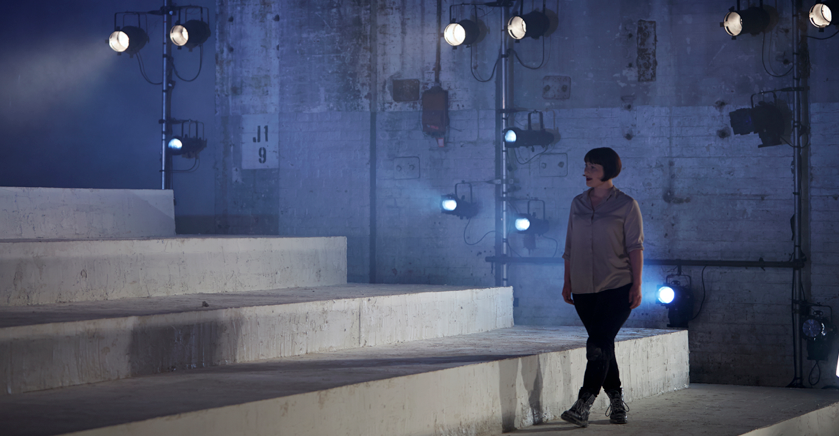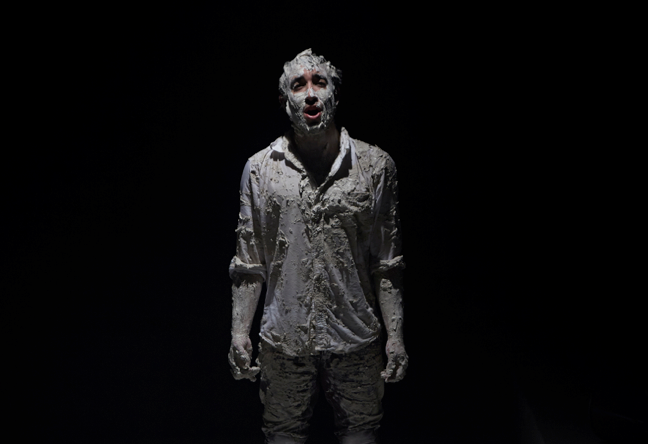Carriageworks, Sydney
May 2, 2015
Fly Away Peter, David Malouf’s poignant 1982 novel about the bond between Jim, a bird-watcher, Ashley, a landowner and Imogen, a photographer, travels movingly from the Queensland coast to the battlefields of France during World War I. Using a highly poetic language as much as standard narrative techniques, it immediately strikes you as eminently singable. Its expression of simultaneous viewpoints of home and abroad, plus its intense reflections on the meaning of life, love, war and nature through the crucial subjective detachment of the central character, in many ways make Fly Away Peter a perfect vehicle for opera. Those (and a few other laudable reasons) help make Sydney Chamber Opera’s premiere of librettist Pierce Wilcox and composer Elliott Gyger’s operatic adaptation an unqualified triumph.

Firstly, Wilcox’s text is a brilliantly efficient edit of Malouf’s novella revelling in the sheer poetry of bird and place names while honing in on certain lines that echo and re-echo throughout the work’s 75 minutes. Relishable words like dotterel, tattler bird and whimbrel; an casual observation like “dollar bird down from the Moluccas”; memorable phrases such as “I have taken a wrong turn in my sleep”, “the world tilts”, and “I am a man – I will dig” are the building blocks that go to make up a very fine libretto. The metaphors of migrating birds for refugees gives it a gratifying modern edge.
Gyger has married this with a multi-layered musical treatment that sees beautifully judged, lyrical vocal lines layered over a frequently acerbic yet fundamentally comprehensible orchestration. It’s not easy music, and considerable credit is due to Jack Symonds clean, clear direction of an impressive septet of instrumentalists, but it is a score that strikes you at once as meriting a second hearing, and that is far from always the case with contemporary opera. It has colour, struture, contrapuntal intergrity and emotional content.

Taking its orchestrational and emotive cue from Stravinsky’s The Soldier’s Tale, the instrumentation is dark and powerful as befits the subject matter. The violin, which for Stravinsky representation of the soldier’s soul, here takes the role of the birds that inhabit Jim’s various worlds. It’s more Messiaen than Sculthorpe, though I could swear I heard a hint of Vaughan Williams’ “Lark” at one point. A battery of percussion (vibraphone and metallic instruments to the fore) and lower sounding voices (bass clarinet, trombone, double bass) are called on to represent airplane engines, the sounds of battle and such like with the austere facility of, say, late Britten. Vocal lines are frequently melismatic, a bit like Tippett, and if I find myself referencing these two British composers, perhaps it is the pacifism of the War Requiem and A Child for Our Time that resonates as much as do their musical credos.
Imara Savage’s highly effective staging never allows us to take our eyes off the ball, focusing not just on the human beings, but through intelligent use of Elizabeth Gadsby’s simple, terraced set and Verity Hampson’s potent lighting design, their place in the world at any given moment as well. Her use of multiple buckets of white clay that ends up coating all three protagonists is a masterstroke, connecting the worlds of Australia and France through images of earth, blood and bone. By the end, the geometrical lines of buckets resemble endless war graves with resonances of the rows of vegetables being planted even as war rages.

All three singers are exemplary. Mitchell Riley, an SCO stalwart, makes a most sympathetic Jim, capturing his marginally detached quality as high priest of the birds without ever seeming actually detached. His clean voice and immaculate diction is occasionally overwhelmed but never significantly so, though the voice does lose focus a little at the top. His accuracy, sense of blend and transcendence of any musical complications, however, make him an ideal singer for this repertoire.
As Ashley, the landowner and therefore inevitable officer material, Brenton Spiteri reveals a lovely, flexible, lyric tenor voice, coping admirably with the challenges of the score. His obvious devotion to Jim and their ultimate demise are captured with an intriguing ambiguity. Jessica Aszodi as Imogen matches the two men note for note, singing with a clean, unfussy delivery and combining beautifully in Gyger’s skilfully written duo and trio sections. If the relationship between her character and the soldiers remains a little undefined, her role as photographer, witness and preserver of memory comes across loud and clear.
Fly Away Peter then, if you’ll pardon the pun, is that rara avis – an eminently doable new chamber opera that deserves to enter the repertoire. Sydney Chamber Opera have firmly established themselves as the force for new Australian opera. Wouldn’t it be marvellous if the government’s opera review decided to reallocate a large slice of the pie to independent outfits such as they? Sadly, one suspects that pigs, like Peter, might fly…
Fly Away Peter runs at Carriageworks until May 9.











Comments
Log in to join the conversation.